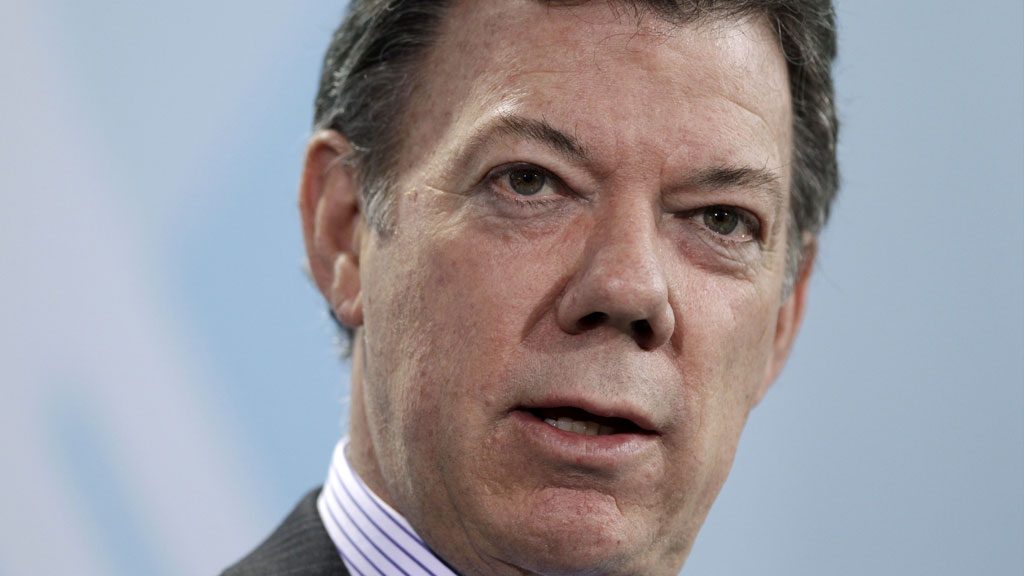Colombian President Juan Manuel Santos said on Thursday that the national government “appreciates” a unilateral ceasefire announced by the FARC, but does not accept the rebels’ condition of international observers to verify the FARC’s commitment to its promise.
According to a press statement published on the president’s website, the ceasefire “is a good start of a process of deescalation of hostilities in the national territory.”
The government and the FARC had agreed to jointly seek for ways to deescalate the armed conflict after the FARC had captured an army general.
The talks were suspended for the duration of the official’s captivity, and only released after a mutual agreement to deescalate the conflict and shield the peace talks from interruptions due to ongoing warfare.
MORE: Colombia peace negotiators meet in Cuba to discuss de-escalation of conflict
Fact sheetPeace talksProfilesJuan Manuel SantosFARC |
No foreign observers
In Wednesday’s announcement, the FARC had asked international bodies like UNASUR and the Red Cross to oversee the ceasefire and the FARC’s will and ability to comply with the promise not to carry out military actions after Saturday.
MORE: FARC announces indefinite unilateral ceasefire, but under conditions
UNASUR, the South American union of nations, on Wednesday said that it was willing to do this.
However, the government rejected foreign oversight of the ceasefire.
“The demand for verification for this unilateral ceasefire is a condition the government does not accept. We are willing to begin the discussion about the issue of verification of an eventual bilateral and definitive ceasefire” once the two negotiating teams have found consensus on all points on the agenda.
Instead, “the government will evaluate the implementation of this decision by the FARC,” Santos said, claiming that “the country does not want to repeat past experiences in which announcements of ceasefires were partly met.
MORE: FARC violence diminished 80% during ceasefire: NGO
Santos tones down on military perseverance
The president did tone down on his previous persistence to continue offensives against the FARC after the guerrillas had said the ceasefire will end “only if it is established that our guerrilla structures have been attacked by the security forces.”
Hours before the FARC announced their ceasefire, Santos had vowed on national radio that “the perseverance of the military offensive will continue.” On several previous occasions the head of state said the national authorities would not “let down their guard.”
MORE: FARC asks for bilateral ceasefire as Santos calls to intensify military offensive
However, in Thursday’s statement, the president said “the government will continue to comply with it undeniable constitutional duty to guarantee and protect the rights of Colombians,” leaving in the middle whether the armed forces will carry out attacks on rebel units.
While conservative opposition forces have long demanded a unilateral ceasefire by the FARC, victims of the conflict on repeated occasions have asked both warring parties to agree on a bilateral ceasefire for the duration of the talks.
MORE: Victims again urge FARC and Colombia’s government to agree on ceasefire
Two years into talks
The FARC and the government have been engaged in formal peace talks since November 2012 to seek a negotiated end to 50 years of violence between state and rebels in an armed conflict that cost the lives of more than 900 thousand Colombians and victimized more than 13% of the country’s population.
While agreeing to negotiate an end of the conflict, the warring parties have been unable to agree on a bilateral ceasefire amid government fears the rebels might use military leniency to regroup.
According to an agreement made between the parties before the talks, a bilateral ceasefire will come into force once there is a peace deal.
Sources
- Comunicado de Prensa (President’s Office)


